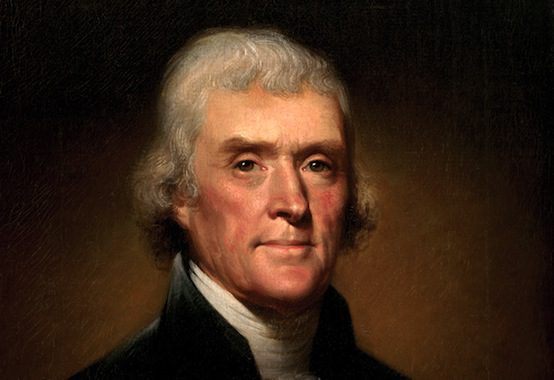James DeLong vs. Thomas Jefferson: There Is No Natural Right to Intellectual Property

At National Review, James DeLong cautions conservatives not to be too hasty to embrace intellectual property reform.
DeLong grants that “[w]e probably need a clean-sheet rewrite of copyright law,” but takes issue with the controversial memo on reform released by the Republican Study Committee, and supports its retraction.
Later he makes the considerably stronger claim that the RSC should refrain from considering IP reform except in the context of property rights writ large.
This conflation allows DeLong to engage in a little smug property rights tut-tutting, as he suggests that the content industry’s copyrights should be held ransom in exchange for an affirmation of the value of property rights:
If [the content industry’s] producers believe that property rights are good things for them, then the RSC should extract in return explicit public recognition and political support for the proposition that property rights of all kinds are an essential element of a free and functioning market economy.
Besides being a childish conceit, that’s the wrong approach.
Republicans will get nowhere on this issue without drawing a clear distinction between both types of property. The traditional Lockean conception of a property rights as natural rights stems from the physical problem of scarcity. Intellectual property is not scarce in the same way as a car or a parcel of land. If an idea is taken from someone else, you haven’t deprived the original owner of anything. Jefferson was quite positive about this, and got downright rapturous in his description of how ideas proliferate, “peculiarly and benevolently designed by nature, when she made them, like fire, expansible over all space, without lessening their density in any point, and like the air in which we breathe, move, and have our physical being, incapable of confinement or exclusive appropriation.”
So granting of intellectual property exclusivity means artificially imposing scarcity, by government force. With the challenge posed to maintaining that exclusivity in the digital age, governments have had to be even more forceful, moving from primarily civil actions to criminal prosecutions. He says this government-imposed exclusivity is not the same thing as a monopoly, and that “anyone who repeats that irritating error should be ignored.” One wonders if he thinks we should ignore Thomas Jefferson, who used the term twice in that letter.
DeLong unnecessarily conflates private property, which has a solid basis in natural rights, with intellectual property, which the Constitution justifies in solely utilitarian terms. Though DeLong says the Constitution’s copyright clause was “meant to recognize both the natural rights and moral claims of creators and the importance of incentives,” contrary to the text, Jefferson, at least, explicitly stated that this isn’t so:
It has been pretended by some, (and in England especially,) that inventors have a natural and exclusive right to their inventions, and not merely for their own lives, but inheritable to their heirs. But while it is a moot question whether the origin of any kind of property is derived from nature at all, it would be singular to admit a natural and even an hereditary right to inventors. … If nature has made any one thing less susceptible than all others of exclusive property, it is the action of the thinking power called an idea
We won’t be able to proceed to a serious discussion about what balance of IP protection we ought to have until we stop pretending intellectual property is the same as other types of property and that it’s a God-given right to have the government enforce its exclusivity, in the case of copyright, 70 years after the creator’s death.
[Update: Guess we oughta ignore Virginia Postrel too.]
Comments